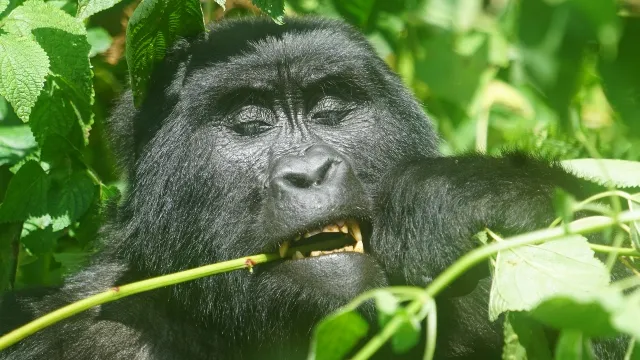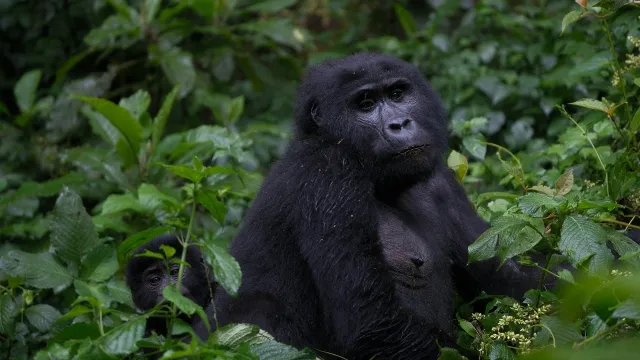Most people are surprised to learn that mountain gorillas, often seen as fierce, are in fact gentle and highly social creatures. Misconceptions can stop travelers from experiencing one of nature’s most powerful encounters in the Pearl of Africa, while also missing the true story of these endangered primates.
Discover how responsible overland trekking with Detour Africa not only brings you close to the majestic gorillas in Uganda’s Bwindi Impenetrable National Park but also helps protect their future. We specialize in turning this bucket-list item into a genuine, conservation-focused adventure.
Trekking Gorillas Explained and Common Myths
Trekking mountain gorillas represents one of the most extraordinary wildlife encounters on our planet. These magnificent creatures, found almost entirely in the dense rainforests of East Africa, are complex social beings with intricate family structures. Uganda, home to nearly half the world’s mountain gorilla population, is the premier destination for this life-changing experience.
Mountain gorillas are not the aggressive, dangerous creatures many people mistakenly believe them to be. In fact, they are generally peaceful, highly social animals living in structured family groups led by a dominant silverback male. When you trek with Detour Africa, your presence and permit fee directly support the local conservation efforts that protect these incredible animals from threats like poaching.
Some common myths about gorilla trekking need dispelling. Our expert-led small-group tours with professional local rangers ensure the experience is both secure and respectful.
Dispelling Gorilla Trekking Myths:
Myth: Gorillas are aggressive and will attack humans
Reality: They are typically calm and avoid direct confrontation. Following our mandatory 7-meter viewing distance keeps both you and the gorillas safe.
Myth: Gorillas are dangerous predators
Reality: They are peaceful herbivores who spend their day eating and resting. Their diet consists of leaves, shoots, and roots.
Myth: Gorilla populations are stable
Reality: They remain critically endangered. The Uganda Wildlife Authority (UWA) permit fee is a vital, non-negotiable contribution to their survival, which Detour Africa organizes for you.
When you book a Uganda Gorilla Trekking Overland Tour with us, you’re not just observing wildlife—you’re participating in a critical conservation journey.


Africa’s Top Destination: Uganda for Gorilla Trekking Tours
Detour Africa focuses its gorilla trekking expertise on Uganda, the “Pearl of Africa,” offering the most authentic and value-packed overland adventures to this spectacular country.
Our primary destination for the trek is:
Uganda: Bwindi Impenetrable National Park
This UNESCO World Heritage Site is an ancient, mist-shrouded rainforest that hosts the largest number of mountain gorilla families.
The Detour Africa Base: We typically use the beautiful Lake Bunyonyi area as our base for the trek, offering picturesque views and a great place to relax before or after your strenuous hike.
Why Choose Uganda with Detour Africa?
Diverse Adventures: Our tours, like the 15 Day Masai Mara and Gorillas Expedition, strategically combine the gorilla trek with other Ugandan highlights (like chimpanzee trekking in Budongo Forest) and iconic East African sites.
Overland Experience: We offer a unique overland adventure style in purpose-built vehicles, perfect for the traveler seeking genuine adventure and connection with a small group of like-minded explorers.
Choice of Comfort: Whether you prefer the authentic adventure of our 8 Day Gorilla Encounter Camping Tour or the comfort of the 8 Day Gorilla Encounter Lodge Safari, Detour Africa has an option that suits your style and budget.


The Detour Africa Overland Trekking Experience
Gorilla Trekking Tours are seamlessly integrated into a larger overland experience, ensuring all logistics are handled, from border crossings to reaching the park gates.
A typical trekking day, which is a key component of our longer adventures like the 37 Day Gorillas and East Africa Tour, involves:
Key Stages and Detour Africa’s Advantage in Uganda:
Pre-Trek Briefing
Detour Africa Commitment: Handled by our experienced crew and local rangers, covering health checks, tracking protocols, and the ‘Detour Africa’ commitment to conservation.
The Trek
Detour Africa Commitment: A guided hike through dense forest with professional rangers and trackers.
Porters and Community
Detour Africa Commitment: We strongly encourage hiring a local porter (approx. $20 USD). This not only assists you on the difficult terrain but is a direct, meaningful way to support the surrounding Batwa community and conservation efforts.
Gorilla Observation
Detour Africa Commitment: The legally mandated 1-hour observation is strictly and respectfully adhered to. Our guides ensure you get the best viewing angle while maintaining the 7-meter safe distance.
Overland Transit
Detour Africa Commitment: Travel between sites in the comfort and camaraderie of the Detour Africa overland truck, sharing stories and photos with your small-group adventure companions.
Frequently Asked Questions
What should I know about gorilla trekking safety?
Gorilla trekking is generally safe when guided by professional rangers. It’s important to maintain a safe distance from the gorillas (at least 7 meters), follow ranger instructions, and adhere to health and safety precautions to minimize risks.
How do I prepare physically for a gorilla trek?
Preparing for a gorilla trek requires good physical fitness. Visitors should engage in cardiovascular exercises, practice hiking, and be ready for steep and rugged terrain typically found in the gorilla habitats.
What are the essential items to bring on a gorilla trekking tour?
Essential gear for a gorilla trek includes sturdy hiking boots, layered clothing for changing weather, rain gear, a hat, gloves, a refillable water bottle, and a camera with a zoom lens for wildlife photography.
How does the permit system work for gorilla trekking?
Gorilla trekking requires a permit, which is typically expensive and must be booked in advance. These permits help regulate visitor numbers, ensuring minimal environmental impact while contributing to conservation efforts for the gorillas.
Recommended
- Gorilla Trekking Tours | Uganda Safaris | Detour Africa
- 8 Day Gorilla Encounter Camping Tour | Detour Africa
- 8 Day Gorilla Encounter Lodge Safari | Detour Africa
- Uganda | Gorilla trekking Overland Tours | Detour Africa
- Complete Guide to Safari Trips in Africa – Namibia Luxury Safaris | Book Your 2025/2026 Adventure Today